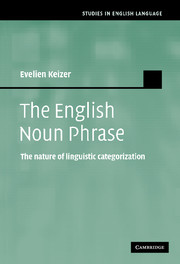Book contents
- Frontmatter
- Contents
- Acknowledgements
- 1 Introduction
- PART I The structural approach: possibilities and limitations
- 2 Headedness within the NP
- 3 Close appositions
- 4 Appositions with of
- 5 Binominals
- 6 Pseudo-partitive constructions
- 7 Sort/kind/type-constructions
- 8 Conclusion
- PART II The cognitive-pragmatic approach: some applications
- Bibliography
- Author index
- Subject index
2 - Headedness within the NP
Published online by Cambridge University Press: 25 January 2010
- Frontmatter
- Contents
- Acknowledgements
- 1 Introduction
- PART I The structural approach: possibilities and limitations
- 2 Headedness within the NP
- 3 Close appositions
- 4 Appositions with of
- 5 Binominals
- 6 Pseudo-partitive constructions
- 7 Sort/kind/type-constructions
- 8 Conclusion
- PART II The cognitive-pragmatic approach: some applications
- Bibliography
- Author index
- Subject index
Summary
Introduction
This chapter introduces of some of the key notions to be used in part I of this study, in particular those relevant to the discussion of headedness within the NP. It reviews those syntactic, semantic and pragmatic notions applied in previous linguistic accounts which play an important role in the analyses presented in subsequent chapters. More detailed descriptions, as well as proposed modifications, can be found in these later chapters; the present chapter is simply meant to provide the necessary background information and serves the additional purpose of dispelling some of the prevailing terminological confusion.
Internal structure: headedness within the NP
One of the reasons headedness has proved a rather elusive notion is that it can be, and has been, defined at a number of levels. In traditional grammar the term ‘head’ was used to capture linguists' intuitions about what constituted the most important part of a phrase (its central element or nucleus) and was consequently described in semantic terms. More theoretically inclined linguists, on the other hand, felt the need to couple this notion to the formal behaviour of the elements in question; as a result, certain morphosyntactic tests came to be used to establish headedness. Unfortunately, however, there proved to be numerous cases where the two approaches would select different heads. A third type of test for headedness, based on pronominalization, also failed to provide conclusive evidence.
- Type
- Chapter
- Information
- The English Noun PhraseThe Nature of Linguistic Categorization, pp. 9 - 21Publisher: Cambridge University PressPrint publication year: 2007



